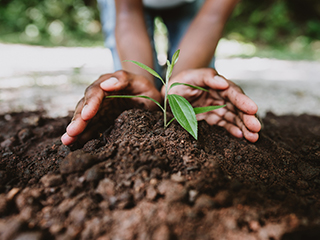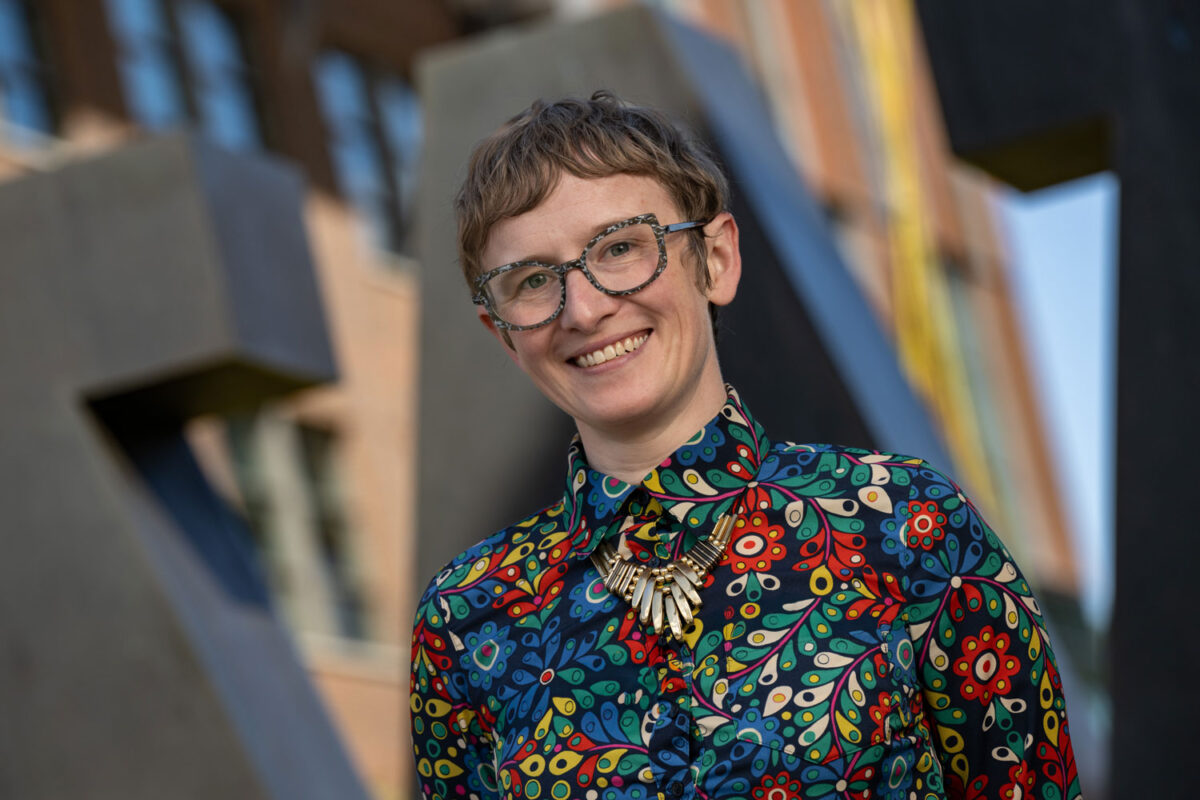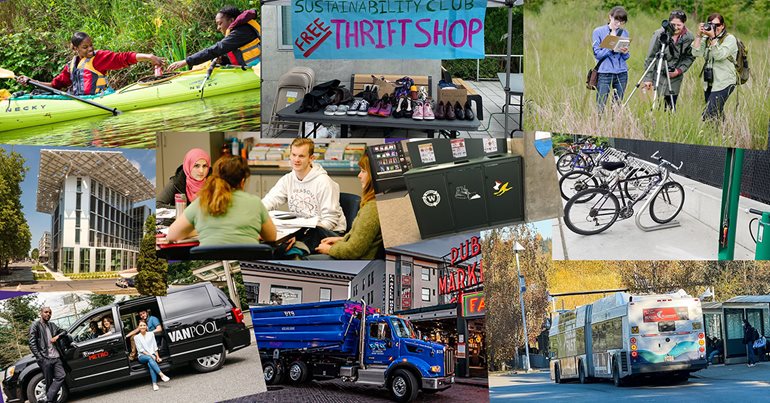
The celebration of Earth Month began on April 22, 1970. Even in its inaugural year, it attracted 20 million Americans in a nationwide patchwork of demonstrations and community activities. Over time, the celebration has become increasingly popular, and now, 23 years later, Earth Month is widely recognized as one of the most important month-long observances in the world.
“It’s a time to raise environmental awareness about the issues that affect our planet, especially during this time of crisis,” said Rachel Luther, sustainability coordinator at the University of Washington Bothell.
As many know, the climate crisis continues to worsen. There have many reminders this year of the increasingly grave consequences that will occur if current trends continue — from catastrophic flooding in Pakistan and China and record-breaking heat waves in the United States and Europe to severe drought in Africa and record ice melt at the North and South poles.
“There is no question that the Earth is facing serious challenges,” Luther said, “but it is also filled with millions of people who are dedicated to finding solutions, and I think it’s important to focus on that, too.”
Inspiring change-makers
That is why this year UW Bothell will be celebrating Earth Month with Project DrawDown, a nonprofit organization that seeks to help the world reach “drawdown” — the future point in time when levels of greenhouse gases in the atmosphere stop climbing and start to steadily decline.
“A number of professors from the University have participated in the organization’s research,” Luther said, “and now we are using its open source research and information to inform and inspire our programming.”
Project DrawDown is the product of more than 70 experts from 22 countries around the world who have come together to identify the 100 most substantive ways we can reduce global warming. “We chose this because we want to focus on climate solutions and hope for the planet, rather than the challenges we face,” Luther said.
“Our goal is to develop Earth Month programming that inspires students to be change-makers.”
Celebrating sustainability
Since its founding in 1990, UW Bothell has been celebrating Earth Day in various ways. And through the years, it has slowly grown from a single day to a week to a full month of events and education.
“Sustainability and care for our planet is one of UW Bothell’s core values, and we are excited to celebrate that,” Luther said.
The University practices sustainability in a number of ways, perhaps the most notable being the 58-acre wetland that was restored at the same time the campus was built. “Because the North Creek Wetland is home to many species of birds and animals, including two families of beavers and a salmon-bearing creek, we take special care to ensure that our campus grounds have a positive impact,” Luther said.
UW Bothell’s campus grounds are managed 100% organically, and the University has been recognized as having one of the most environmentally friendly college grounds in the nation.
“We have been certified Salmon-Safe since 2006, we have multiple National Wildlife Habitat gardens, and we are a pollinator-friendly campus,” Luther said. “In addition, we have multiple solar arrays on campus, we purchase 100% renewable electricity, and we have a load shedding program that reduces building energy use while also increasing energy efficiency.”
Heading into the weeds
This year for its Earth Month celebration, UW Bothell will be hosting a number of sustainability-related events, one of which is Farm Lunches. Here, students can join the grounds team and staff from UW Bothell Sustainability and Cascadia College Sustainable Practices for an introduction to gardening series.
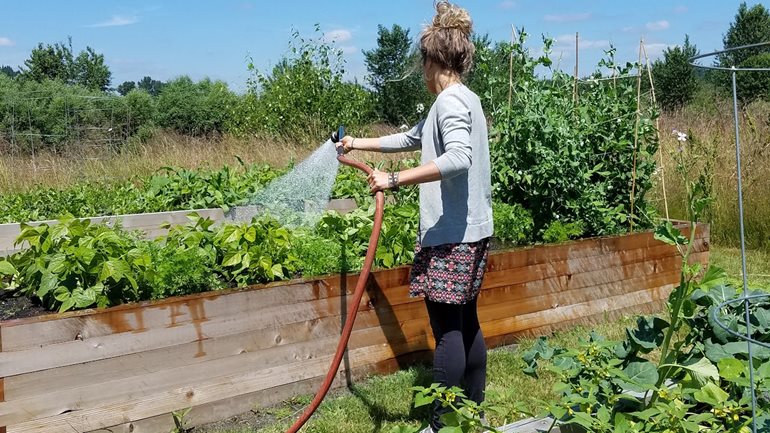
“Students can get their hands dirty sowing weeds, transplanting starts and weeding garden beds,” Luther said. “This activity will be paired with a faculty speaker who can educate students on pollinator-friendly gardening, local organic agriculture and growing landrace crop varieties.”
According to Project DrawnDown, how people eat and, more importantly, how they grow food has vast implications for the climate. “Reducing food waste and choosing plant-rich diets have the most potential for carbon reduction if implemented at a global scale,” Luther said. “While these solutions will require global change, I wanted to show students that it starts at home and that there are things individuals can do to make a difference.
“If every individual does a little bit, that has vast implications.”
Taking care to repair
Those who lack a green thumb will have other options to participate — such as the Repair Cafe. Most people have that one remote that never works, that sweater with a tear in it or that favorite lamp that just keeps burning bulbs. With the help of the Repair Cafe, people will have the chance to fix their broken items so that they can be put back to use again.
“Students can bring their items to the Collaboratory on April 11 and have a team of experts from the WSU Snohomish County Extension fix them. They will be assisted by Collaboratory interns and UW Bothell Mechanical Engineering students,” Luther said, noting that the expert team specializes in jewelry, wood products, lamps and sewing projects.
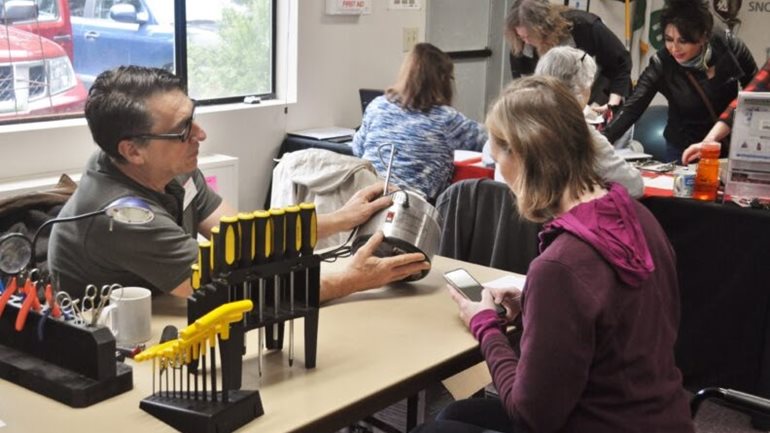
The Repair Cafe is designed to focus on reducing waste, an integral part of sustainability. “Increasing the lifespan of products we use is inherently sustainable because each time we buy a new product, that requires inputs of raw materials that put more strain on the environment,” Luther explained. “I encourage everyone to reduce their impact by minimizing the waste they create through reusing or recycling items whenever possible.
“In fact, the Washington State Legislature has a Right to Repair bill that if passed, would allow consumers to repair their own electronic devices rather than relying on manufacturers.”
Tiny changes, tremendous impact
Students particularly passionate about sustainability can also attend an environmental career fair along the campus Promenade on April 26. Representatives from organizations such as the Department of Ecology, Zero Waste Washington, Sound Salmon Solutions, Oxbow Farm, the Peace Corps and Friends of North Creek Forest will be on site to advertise jobs, internships and volunteer opportunities open to current students — and recent graduates.
“We are excited to have representatives from different sectors of the economy, including nonprofits, corporations, governmental agencies and consultants, to give students a flavor of the wide variety of environmental careers that exist,” Luther said.
“My hope for Earth Month is that every student realizes that they have a place in the environmental movement, even if they don’t make it their profession. We only have one Earth, and we are its stewards.”

